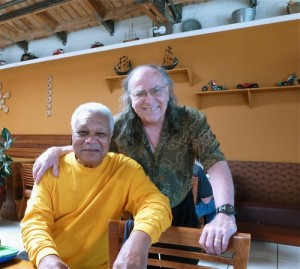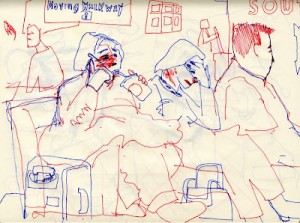Written in the style of Chaucer’s Canterbury Tales, this “tale” describes Jack Foley and his favorite restaurant, Nong Thon:

The Foley’s Tale
“Yum yum,” quod Jack in his demented weye.
“Nong Thon I go!” as it wolde him purveye
a blissful meal, in cas ye care to woot,
it maketh him to daunce with merry foot.
The menu he inspecteth full greet deel,
and none escapeth his devoted zeal.
He bringeth wyf, he bringeth all his freendes
but telleth noon especially the feendes.
O Thai ice tea to sooten first the lippes.
His gat-toth wyde as with alle sippes.
Imperial rolls priketh his corage.
A bowl of beef pho is his pilgrimage.
His heer crispeth like that of squid and shrimp.
Dessert a must, or else the day lieth limp.
“Most thynges are wood and few are very holy.
But eating well is God,” seyde Mr. Foley.
*
and Jack answered,
The Foley’s Tale / With Clarion
(Two poete fowles makynge melodie!)
“Yum yum,” quod Jack in his demented weye.
Ah, Clara comes to the heroic coup
“Nong Thon I go!” as it wolde him purveye
Insted of balking thir, she eats it up
a blissful meal, in cas ye care to woot,
She counteth syllables and maketh rhymes
it maketh him to daunce with merry foot.
Hir inspiration’s hotte and gretly steams
The menu he inspecteth full greet deel,
She writeth Middle English with such es
and none escapeth his devoted zeal.
None wolde wiste that she was born Chinese
He bringeth wyf, he bringeth all his freendes
She also liketh to go to Nong Thon
but telleth noon especially the feendes.
She eateth all that is the menu on
O Thai ice tea to sooten first the lippes.
She drinketh tea, she slurpeth up her pho
His gat-toth wyde as with alle sippes.
(She redeth of the Wyf of Bathe also)
Imperial rolls priketh his corage.
She hath gone far—though not to Walla Walla–
A bowl of beef pho is his pilgrimage.
She liketh taking trippe and telling tale
His heer crispeth like that of squid and shrimp.
Though Hong-Kong born, she is a pilgrim certes
Dessert a must, or else the day lieth limp.
But nonethelesse enjoys hir swete dessertes
“Most thynges are wood and few are very holy.
It’s rare, she saith, that I be caught in error!
But eating well is God,” seyde Mr. Foley.
She is a verray parfit poet: Clara!


